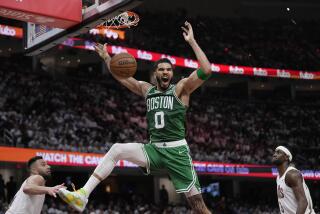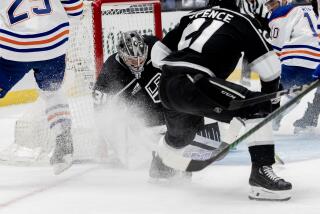Cartwright’s Gain Could Be Knicks’ Loss
- Share via
The most intriguing of the four NBA conference semifinal series continues to be Chicago vs. New York, because it’s the only one that continues. Detroit and the Lakers swept their opponents, though they were discreet enough not to parade a broom along the alien court like the win-goofy Knicks did in Philly; Phoenix needed only five games to derail Golden State, the Little Engine That Couldn’t Quite.
The focal point of the Knicks-Bulls series, justifiably, has been Michael Jordan, whose presence on the court is like Sinatra’s on stage -- you can’t take your eyes off him. If you’re a Bulls fan, you’d have to be encouraged by Game 5, even though Chicago lost. (The next sentence is pretty scary; you may want to exercise parental discretion before letting your children read it.) Jordan got 38, but it was an unkempt 38; he rimmed a covey of open jumpers, and went 11:58 of the second period without scoring a single point. Yet even without Jordan being Jordan, Chicago still managed to be only a 3 away from tying the game within the last two minutes against a wounded lion of a team that won 26 in a row at home earlier in the season. New York can’t play much better than it did. Jordan can.
Knicks Coach Rick Pitino might have made the savviest of all postgame comments, when he said, “We can’t keep worrying about Michael Jordan. We have to worry about the Knicks’ offense.”
Historically, Jordan ringing points up like call waiting doesn’t ensure a Chicago victory. When he gets 40 or more, the Bulls are 6-4 in the playoffs; when he gets 50 or more, the Bulls are 2-2.
The Knicks aren’t losing just because of Jordan-they’re also losing because they’ve been heatedly defended. During the regular season New York averaged 116.7 points, third best in the NBA. Through four playoff games against Chicago that average was 101. Game 5 was the first time New York didn’t play incognito.
The Knick whose offense had lapsed most dramatically was Patrick Ewing. He averaged 22.7 points in the regular season, and 17 in New York’s three playoff losses. After being compared to Rip Van Winkle, Ewing detonated for 32 in Game 5. But the irony of the series is that while Jordan’s the player of impact, the player of destiny has been the one guarding Ewing -- “pushing him, that’s all I’m doing, just pushing him” -- Bill (Would Someone Hand Me My Oil Can) Cartwright.
Yes, Mr. Bill.
The same Mr. Bill who labored long and drearily for the Knicks.
“You’re (something smelly), Mr. Bill,” Garden fans would serenade, “really (something particularly smelly).”
Does he who whiffs last whiff best?
He’d been drafted by the Knicks in 1979, played for three winning teams in eight years, and came to symbolize the frustations of the franchise. He played a soft center; a nice shooting touch, but no warrior banger. (People looking at Cleveland’s Brad Daugherty, in their nightmares, see Mr. Bill.) By the close of last season everybody in New York had given up on him. Cartwright was ineffective at big forward, where he’d been posted after Ewing’s arrival. His points (11.1) and rebounds (4.7) were dropping off the table. His fits-and-starts playing style resembled a cab trying to go up Sixth Avenue in rush hour.
So it was with glee, and the intoxicating scent of unbridled larceny, that the Knicks announced last summer they’d traded Mr. Bill to Chicago for Charles Oakley. Not only had they dealt age for youth-Cartwright is 31, Oakley 25-but they’d dumped an unwelcome player and brought in a stud rebounder. On Chicago, Oakley averaged 13 rebounds a game for two years. He was just what the Knicks needed alongside Ewing. Not only that, but he scored 12 a game, which was more than Cartwright. A steal? The Brinks job should have been so thorough.
All season long the trade still looked aces. Oakley’s numbers (12.9 points, 10.5 rebounds) surpassed Mr. Bill’s (12.4, 6.7), and Oakley was the signficant addition as New York vaulted from 38 victories to 52. But here in the playoffs Mr. Bill has reopened debate by elevating his game beyond what anybody thought possible. He has been shoving Ewing off the low block, and entirely out of the paint. Ewing, consequently, is getting the ball out of his comfort zone and shooting from unpleasant distances. In Game 5, Ewing, who most assuredly is a warrior banger, was suddenly and stunningly dominant, particularly at the end of the game when it mattered most, scoring seven of the Knicks’ last nine. (Mr. Bill had fouled out by then.) But in the Knicks’ three losses, Ewing shot 43.8 percent; usually he shoots 56.7. Cartwright averaged 16 points, one behind Ewing. They shouldn’t be that close even if they lockered together.
“Numbers don’t mean a lot as far as I’m concerned,” Cartwright said in his familiar, self-effacing husky whisper. “Are you helping your team? This is a team game.” It would be fun to report that a thin smile of vindication crossed his lips, but Cartwright remained expressionless. “I’m not into that anymore,” he said. “It takes away from what I’m thinking about, which is winning games and having the possibility to do something I’ve never done before -- play for the Eastern Conference championship.” Now the smile appeared. “After that it’s only one more step to the NBA championship.”
Turning thoughtful again, Cartwright reviewed his tenure in New York with a surprising affection. Disdaining Byron’s “Sweet is revenge,” for Bacon’s “A man that studieth revenge keeps his own wounds green,” Cartwright said, “My goal isn’t for any revenge in New York. I established myself here. I became financially secure here. Now all my goals are about being on a successful team that has a chance of winning it all.”
More to Read
Go beyond the scoreboard
Get the latest on L.A.'s teams in the daily Sports Report newsletter.
You may occasionally receive promotional content from the Los Angeles Times.










